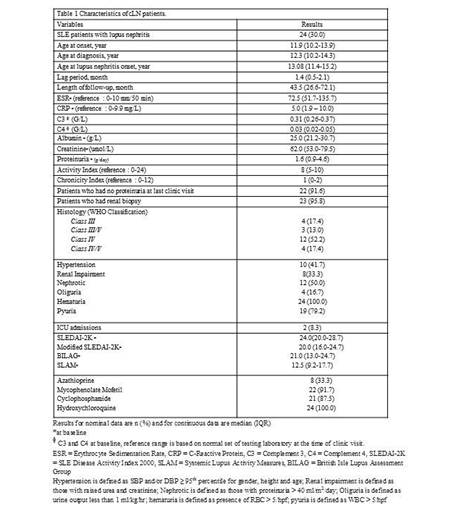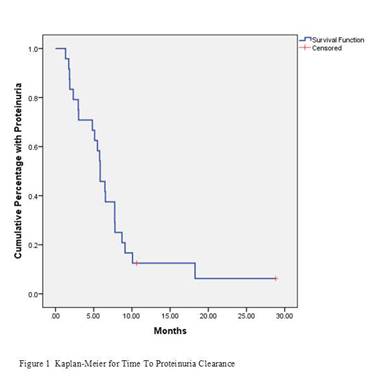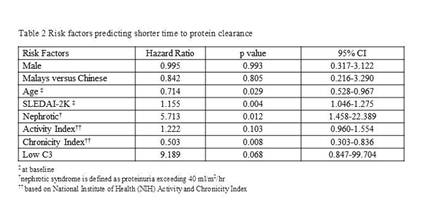Session Information
Date: Sunday, November 8, 2015
Title: Pediatric Rheumatology – Clinical and Therapeutic Aspects Poster I: Lupus, Scleroderma, JDMS
Session Type: ACR Poster Session A
Session Time: 9:00AM-11:00AM
Background/Purpose:
The time to recovery from
proteinuria in patients with lupus nephritis (LN) receiving standard treatment
has been described in adult, but not in children. In adult, 52% recovered from
proteinuria within 2 years and 3/4 within 5 years. We aim to determine the time
to recovery from proteinuria and to identify factors predicting time to
improvement.
Methods:
Twenty-four childhood-onset lupus
nephritis (cLN) patients receiving standard treatment, were identified from our
lupus registry followed from Jan 1, 2009 to May 31, 2015. Indication for biopsy
includes persistent proteinuria ≥ 0.5 gm/day or spot protein/creatinine
ratio > 0.2. Demographic, clinical, laboratory, disease activity indices and
histological data were collected. Time to recovery from proteinuria was assessed
by Kaplan-Meier analysis. Risk factors associated with proteinuria resolution
were evaluated using cox-regression models.
Results:
Twenty-four
cLN patients (66.7% females) were recruited. Majority were Chinese (54.2%),
followed by Malays (29.2%). No
Indian patients had LN. 83.3% cLN patients presented at diagnosis. Median time
to protein clearance was 5.8 months (Fig 1). About 90% recovered from proteinuria
within 18 months. Higher SLEDAI-2K scores at diagnosis was associated with
shorter time to protein clearance. (HR 1.155, 95% CI 1.046-1.275, p=0.004). Older
age, higher chronicity index and nephrotic at baseline were associated with
longer time to protein clearance while gender, race, activity index and low
complement were not significant risk factors. (Table 2)
Conclusion:
Faster urinary protein clearance
was demonstrated in our cLN cohort receiving standard treatment compared to
that of adults (5.8 months vs 2 years) and 90% achieved in 18 months. Patients
with higher disease activity at baseline seem to respond better to treatment
with shorter time to protein clearance. Consistent with adult findings,
patients with higher level of proteinuria at baseline needed longer time to
achieve protein clearance.
To cite this abstract in AMA style:
Tan JHT, Hoh SF, Tanya M, Das L, Win MTM, Chan YH, Arkachaisri T. Proteinuria in Childhood Onset Lupus Nephritis: When Does It Go Away ? [abstract]. Arthritis Rheumatol. 2015; 67 (suppl 10). https://acrabstracts.org/abstract/proteinuria-in-childhood-onset-lupus-nephritis-when-does-it-go-away/. Accessed .« Back to 2015 ACR/ARHP Annual Meeting
ACR Meeting Abstracts - https://acrabstracts.org/abstract/proteinuria-in-childhood-onset-lupus-nephritis-when-does-it-go-away/



